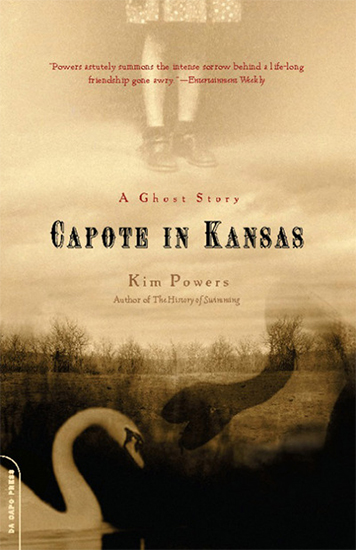Capote in Kansas: A Ghost Story
Truman Capote and Harper Lee were children when they met. Twenty-five years later, Capote had taken New York’s literary world by storm, while Lee struggled to put pen to paper and sweat out the story of her childhood in the same city. They would reunite in the desolate plains of Kansas to create In Cold Blood. And they would start talk of an even greater mystery: What happened between them—and who really wrote To Kill a Mockingbird? How did two innocents from a backwoods Southern town achieve such fame, and why did they stop speaking to one another? Kim Powers has conjured a death-bed confession from Capote, in which he picks up the phone to Harper Lee one last time to tell her is being haunted—a tale she doesn’t believe, until she is forced to. What do the ghosts of the Clutters want, as they appear one by one to confess their secrets and their anger to the most unlikely mediums of Capote and Lee? Capote in Kansas is an unforgettable “what might have been”—a fantasia of ghosts seeking resolve and revenge, and memories and regret for a past that was, that will never be again.
“Powers guides us, Virgil-like, into the underworld of haunted houses, haunted books, and haunted psyches…hair-raising and clever…If you’re involved in a serious book club (or literature seminar), Powers’ novel would be the only place to begin an incredible examination of the works and lives of Truman Capote and Harper Lee.”
—The Bloomsbury Review
Praise
Interviews
“I do believe in ghosts, by the way, but mine aren’t the type that go bump in the night. They’re the ghosts that come to us in our dreams, or the ghosts of guilt that haunt us (me, at least) during our waking hours.”
“I loved the idea that this woman we assumed was so sentimental and lyrical could get into the blood and gore of a true crime story. Mind you—doesn’t that sound Southern?”
“In the fourth grade, I checked out what I considered my first grown-up book, a biography called Storming Heaven about the Roaring Twenties evangelist Aimee Semple McPherson. I took it on vacation with me and accidentally left it in the back seat of our hot car. Its plastic cover melted, and another battle over a library fine began with Mrs. Jerry Lewis, the not-so-funny librarian. I felt like I gave most of my allowance—fifty cents a week—to that woman. But the books were worth it.”
“The sight and sounds of me writing: it used to look like an outtake from The Exorcist, or something from The Three Faces of Eve. Scary.”
“I tried a sort of roman a clef approach at one point, changing their names, but it fell flat. I think for something artistic to work, it needs to be a little risky, a little dangerous, and this was definitely something risky.”
“If you could have Truman Capote and Harper Lee over for dinner, what would you serve them?”
“Both Swimming and Kansas are suspenseful, with quick-moving plots. ‘This might come from my years writing for TV,’ Powers says. ‘Or it could be that my literary influence is Nancy Drew.'”
Reviews
“Powers astutely summons the intense sorrow behind a life-long friendship gone awry.”
—Entertainment Weekly
“Fans of In Cold Blood and To Kill a Mockingbird will welcome this off-beat novel.”
—Publishers Weekly
“[An] exceptional first novel…[Powers] succeeds brilliantly in blending fact and fiction to produce a sensitive portrait of two lost souls. Heartily recommended.”
—Library Journal (starred review)
“[A] blend of fact and fiction about perhaps the greatest back story in American literature.”
—USA Today
“Well-written and at times intriguing…Raises thought-provoking philosophical issues about how writers should use the lives of real people.”
—St. Louis Post-Dispatch
“Through fiction, [Powers] intriguingly focuses on the end of Capote’s self-absorbed life, exploring the demons that haunted his final days…An engaging narrative that sensitively explores the intricacies of transgression and forgiveness within friendship.”
—New Orleans Times-Picayune
“[A] thrilling new novel…[An] unusual tale, which combines elements of historical fiction with a classic ghost story.”
—The Advocate
“Powers guides us, Virgil-like, into the underworld of haunted houses, haunted books, and haunted psyches…hair-raising and clever…If you’re involved in a serious book club (or literature seminar), Powers’ novel would be the only place to begin an incredible examination of the works and lives of Truman Capote and Harper Lee.”
—The Bloomsbury Review
“[A] boldly constructed novel…This book, with its snake boxes and grand ballrooms, will fascinate and please Capote and Lee fans who long for more closure on their sadly frustrating relationship.”
—Curled Up with a Good Book
“Part mystery and part literary homage, Capote in Kansas is a tale about ghosts both literal and figurative–and a tribute to an enigmatic friendship…This is an incredible ‘what might have been’ story.”
—Tucson Citizen

